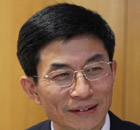-
-

-

-

Star Tracks
Kendra Wilkinson poses with her 11-month-old son at poolside in Los Angeles, November 22, 2010.
-


-
Foreign and Military Affairs
Beijing, Moscow join hands to fight drug trafficking
By Wang Huazhong and Zhang Yan (China Daily)
Updated: 2010-11-25 07:52
 |
Large Medium Small |
BEIJING - Drugs from Afghanistan, which "catalyze terrorism", pose a threat to the stability of China and Russia, a top Russian anti-drug official said.
| ||||
China annually intercepts about 4 tons of the heroin smuggled into the country from Afghanistan, said Ivanov, who is also director of the Federal Drug Control Service.
"China and Russia face the same threat of illegal drugs from Afghanistan, which are also a threat to all member states of the Shanghai Cooperation Organization," he said through an interpreter at a press conference to brief the media about his visit to China.
There are about 500 labs in northern Afghanistan that are being used to manufacture drugs, he said. From there, they are smuggled north into Russia and east via Pakistan into China through the Xinjiang Uygur autonomous region.
According to Ivanov, the rugged mountainous terrain of the route from Afghanistan to Xinjiang is ideally suited to drug trafficking, which helps to fund terrorism and extremism in the Xinjiang and Caucasus regions.
"It is important for our governments to establish common ground where we can tackle drug trafficking as the principal source of terrorism," said Ivanov, who is due to travel on Thursday to Urumqi, the capital city of Xinjiang, to study the situation in depth.
China and Russia have been engaging in close cooperation to combat transnational drug-related crime in the region.
Minister of Public Security Meng Jianzhu and Ivanov on Tuesday attended the sixth ministerial meeting on Sino-Russian anti-drug cooperation, where they signed a memorandum on the latest round of talks as well as a deal on combating illicit trafficking of narcotic drugs, psychotropic substances and precursor chemicals.
Meng said China wants to work with Russia to improve the exchange of information on controlling drugs, tap the potential for cross-border cooperation, enhance communication on important international anti-drug issues and curb the rise of transnational drug-related crime.
Ivanov said a recent joint operation in border areas around the northeastern Chinese province of Heilongjiang resulted in 15 Russian and Chinese smugglers being detained and the dismantling of three labs used to produce amphetamines.
China has sent more than 50 drug control officials and police to Russia for training as the illegal drug trade booms across the borders.
"The issue can only be addressed by joint efforts and there is no time limit on that cooperation," Ivanov said.
Cao Yin contributed to this story.




